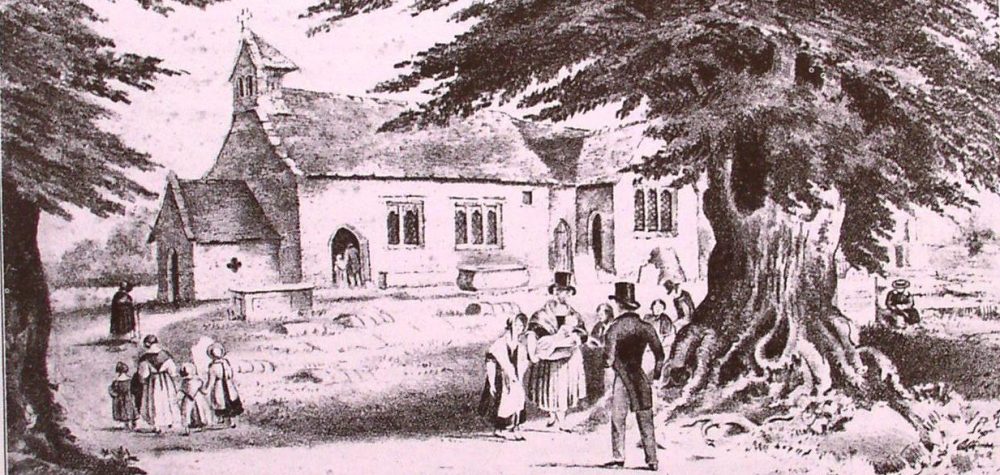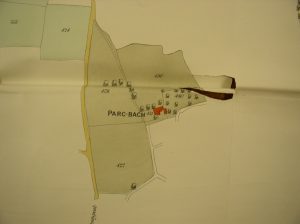April 13th – Goytrey Cymrodorian
Easter Monday being the anniversary of the Cymrodorian society, the members of this club as usual assembled at the Half-Way House to celebrate their festal day. Additional interest was felt in the proceedings, as it was known that the worthy proprietor of Goytre House, Leuit. Col. Bird intended to present a new banner to the society.
Accordingly, the members dressed in their scarves &c and proceeded by the Newport factory band, marched in procession to Goytre House, to receive their promised present. Here they met the gallant Colonel and his sons, Messrs C & T Bird in readiness to receive them. The officers of the club then came forward, and received the banner from the hands of the Colonel who then addressed them as follows:
‘My friends, in presenting this banner to your club, permit me to accompany it with my earnest wishes for the prosperity of the Goytre Cymrodorian society, whose property is it now to become. I greatly rejoice in the success that has now attended your society, and I am thankful to see many old friends among the members as well as others who have become personally known since it has been my happiness to reside among you. I trust that the mutual regard which has arisen, will be maintained among us, and this banner may be a token that cordial and friendly feeling will ever exist between us.
I am especially delighted to see a friendly society established in the old parish of Goytre, to which memories of the past, and pleasures of the present, so much endear me. I have carefully studied your rules, and they are all that are proper and beneficial to such an institution, and I hope all the members will do their utmost to maintain them in their integrity, and thus contribute to the welfare of the whole club. In all countries and institutions, ‘union is strength’ and I trust we shall ever be united in true charity, one towards the other, and in our efforts for the general good.
There is a union I pray may also increase amongst us all – the union of faith in the one and only saviour of our souls- that when time and bodily ailments shall be no more, we may be united in that world where there is no more sorrow, sickness or death; but where I trust we who now meet together on earth, may be united in an endless eternity’.
Mr Wm. Gwatkin, the secretary, on behalf of the members, returned thanks to the Colonel on behalf of the members, for the honour he had done them in presenting them with such a handsome pledge of his goodwill and wishes for the prosperity of their society.
Three hearty cheers were then given for the kind donor, and, “For he’s a jolly good fellow &c”, was sang in such strains as evinced that one and all responded from their hearts, and wished to convey to their kind and generous friend that they duly appreciated his gift.
The banner is of blue silk, deeply fringed; on it is beautifully painted the plume of feathers, the well known crest of the Prince of Wales, and his motto ‘Ich Dien’ – I serve, underneath, on a scroll. Encircling this is another scroll, on which is inscribed, presented to the Cymrodian society by Col. H.C. Bird.
The men now reformed their procession and walked to the parish church. The service was read by the Rev. M. Morgan, the incumbent of Mamhilad, and an eloquent and impressive sermon was preached by the Rev. T. Evans from Prov. xxii.3, “A prudent man foreseeth the danger and hideth himself”.
After the service, the club returned to the Half-way house and sat down to a good substantial dinner, which the host, Mr Evans had prepared for them. The Rector and Col, Bird occupied the chief places at the table, supported by the Rev. M. Morgan and C & T Bird.
Ample justice being done to the good things of this world, and the cloth removed, the rector, in a handsome manner, proposed the health of Col. Bird, truly remarking that in their kind friend they all found a willing and steady supporter of anything that could possibly contribute to the temporal and spiritual improvement of the parish, of which they had substantial evidence that day.
(Drunk with cheers!)…. The Colonel in acknowledging the warm and enthusiastic manner, in which the toast had been received, expressed the great pleasure he felt, after a long residence in the East, to find himself again, an inhabitant of the old parish of Goytre. He felt especial pleasure in being among them on that day and hoped to be spared for a long time to help them in their endeavours to assist each other in anything that be beneficial to them. He begged to propose ‘health and prosperity to the Cymrodorian society’, loud cheers…..The same stentorian voices also gave a vigorous “three” for Mrs Bird and family. Mr Gwatkin then proposed the health of the vicar of Goytre and requested him to accept their sincere thanks for the excellent sermon he had given them that day….The Reverend gentleman, in acknowledging the compliment remarked that it gave him great pleasure to be among them at their annual feast. As for his sermon he could only say that he felt it to be no more than his duty, as minister of the parish to render them such services on these occasion; and since several of the members had expressed a strong wish that he would give them his support, he felt much pleasure in complying, and begged they would regard him as an honorary member. This was enthusiastically received.
The evening was spent in a most pleasant manner, and the cordiality with which the day commenced, continued to the close. The band gave great satisfaction: the readiness of them men, their desire to please and their admirable conduct throughout the day were such as to be generally noticed.
At their departure, the hearty thanks and cheers given them told how well they had sustained their reputation….at the earnest request of the club Col. Bird consented to be treasurer and an honorary member of this well conducted and excellent society6th April 1861
Dangerous Exploits of a Cow
On Wednesday afternoon a dangerous cow belonging to Mr T. Lewis was being brought from Llangibby to Pontypool and when near the Stopgate (Monkswood) encountered an old woman named Mary Morris, (My 4 x great grandmother)knocked her down, gored her severely and inflicted several dangerous bruises.
The cow was known to be dangerous and a cord had been attached to horn and leg, but this being to long she was taken to Pantypudding Farm and the rope was shortened, after which she was brought to Pontypool. Here an old woman was knocked down and gored and we hear that after other feats and hairbreadth escapes the brute rushed into the canal, where it was secured and taken home.
June 15th – Merry but Un-wise
W. Lewis, T. Lewis, J. Lewis, J. Jenkins, W. Forty, W. Phillips and W. Plasted, were charged by p.c. Lewis (14) with being drunk, and creating a disturbance at Goytrey, at one o’clock, on Sunday morning last.
The constable said he was on duty that morning and heard a great noise in a farmyard. He went to ascertain the cause, and found all the prisoners there rolling about among the straw and behaving in a very disorderly manner.
He told them that sort of thing would not do, as they were not only disorderly, but trespassing on the private property of Major Bird, when they abused and threatened him…John Cadovan corroborated the main part of the constable’s statement, and in answer to a question from the bench, said the prisoner, W. Lewis appeared to be the most disorderly among them, and egged the others on.
John Jones said he lived at the farm house and saw the prisoners in the yard and they were making a great disturbance. They had been drinking together at the Half-way house and had a gallon and a half of beer with them in the yard, but witness did not see it.
The chairman said it was a most disgraceful disturbance, the more so as it took place on Sunday morning, and inflicted a penalty of 20s on each, or in default, 14 days hard labour in Usk.
December 7th – Servant and Master
John Harvey, farmer, charged with assaulting Joseph Howells, farm servant at Goytrey on November 28th.
Mr Greenway appeared for defendant. Complainant said he was at plough on Thursday when the horses turned stubborn, and he gave one of them a stroke with the plough line. His master said that if he struck the ‘harses’ again he would strike him. He did not strike them again, but told his master he should do no more with them, and he then struck him on the face.
By Mr Greenway, the horses ran away a day or two before, he could not keep the plough in the right place with them, so he threw it down and let them go. Did not kick them. His master scolded him for beating the horses with the plough line. Did not challenge him to fight. Had a fight with a fellow servant a short time since, and ‘got a bit of a scrat on my nose’. Never was threatened to be turned away for ill-treating the horses before this time. Did not call his master a dead fool, but said he was as big a fool as he was.
Thomas Jones, farm servant said he saw defendant strike complainant.
Mr Greenway then addressed the bench on behalf of his client, when he considered he had received sufficient provocation to chastise complainant, who had ill-used his horses, challenged him to fight, and threatened him with his fist…..the magistrates did not consider the defendant was justified in the course he had taken and fined him 20s for the assault or 14 days.
Mr Greenway then complained that p.c. Lewis had exceeded his duty in that he had given the parties advice when he served the summons, for which he was censured by the magistrates.
July 16th
Wm Read was charged with having assaulted Caroline Drinkwater at the Goytrey on the 17th inst., as complainant failed to prove the charge the case was dismissed, she having to pay the 3s costs.


 In 1780 Morgan Evan was the overseer of the poor for Parc Bach, he married Ann Bevan in 1763.
In 1780 Morgan Evan was the overseer of the poor for Parc Bach, he married Ann Bevan in 1763. A 1908 sale catalogue says William Jones is the tenant of Parc Bach paying £22 per year rent and farming 13 acres 3 rood and 3 perches. Three years later in the 1911 census, William Jones is a dairyman aged 39, Annie his wife is 39, their children are Maud 13, Harry 11, Ellin 8, Gertrude 5, Arthur 3 and William 1, all born in Goytre.
A 1908 sale catalogue says William Jones is the tenant of Parc Bach paying £22 per year rent and farming 13 acres 3 rood and 3 perches. Three years later in the 1911 census, William Jones is a dairyman aged 39, Annie his wife is 39, their children are Maud 13, Harry 11, Ellin 8, Gertrude 5, Arthur 3 and William 1, all born in Goytre.